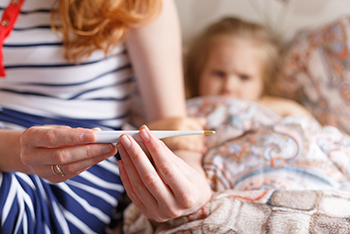Cold and flu season is that time of the year in which centres have to be vigilant and make sure children in the centre aren’t sick and don’t spread it to other kids. Especially now during COVID-19, centres have to make sure policies are in place to minimize the spread. This policy would apply to the children at the centre, staff members and families. Below is a guide to help childcare centre directors and staff members with preparing for cold and flu season and overall minimizing the number of contaminants in the centre.
1. Create and Update your Centre’s Sick Policy
Having a policy in place is the first thing your centre needs to ensure that everyone knows what rules to follow. It should be as detailed as possible so that families and staff members know what exactly constitutes being sick, when it is okay for them to return to the centre, and what will happen if the policy is violated. For example, if a child is sick, parents need to let the centre know and not let their child go to the centre. If a child becomes sick at the centre, then the parent or the parent’s emergency contact will be contacted to pick up the child. This also means parents need to have an updated emergency contact on file just in case the parent cannot be contacted or reach the centre in time.
If your centre already has a policy in place, it will need to be updated to include guidelines for COVID-19. For example, what should be done to minimize the spread of COVID-19, what symptoms mean that someone should not come to the centre, and what happens when someone tests positive for COVID-19.
2. Enforce the Policy
Having a policy is great but it will only be beneficial to your centre, staff members, and families if it is being strictly enforced. You may encounter some uncomfortable situations, but it is important that these policies are followed to minimize the risk of illness and spread in the centre.
3. Send Information to Parents
Your sick policy should be communicated to parents as soon as possible and be readily accessible to them. This allows them to check themselves when it isn’t acceptable to drop their child off at the centre and know what the centre is doing to minimize the spread of germs during cold and flu season. An extra step you can do is include helpful information about the cold and flu season in weekly newsletters. This information can include:
- Nearby flu shot locations
- Signs and symptoms of common illnesses
- Proper hygienic techniques
- Key points about your centre’s sick policy
4. Train Staff
Even if you have your sick policy documented, it is still a good idea to have a training session with staff to ensure they are following the best practices. This includes:
- Proper hygienic techniques
- When to wash hands
- Disinfecting practices in the classroom (i.e. sanitizing the classroom)
- Knowing to stay home when feeling sick
5. Have a List of Backup Staff
There will be times when staff members call in sick, which means you will be short-staffed that day. To be prepared for these situations, your centre should have a list of qualified staff that can come in on these occasions.
6. Clean and Disinfect the Centre Often
Constantly disinfecting your centre is crucial, especially if someone sick comes in or someone tests positive for COVID-19. Particularly because your centre is for children and they can touch and spread germs very quickly, this is a practice that needs to be implemented. So, knowing who, when, what, and how something should be cleaned should be clearly documented and made a routine. For example, toys should always be sanitized after each use and at the end of the day, the centre’s surfaces should be disinfected. If it does become too much, you can always outsource the work.
7. Have Reminders in the Centre
Having reminders placed around your centre can help staff members and children remember what to do when they are in a certain situation. This extra bit of communication can affect the number of sick individuals in your centre. For example, you can have posters in bathrooms and near sinks about proper handwashing techniques.
A simple cough or sneeze can be worrisome, so centres have to make sure they are strict with their policies. It is better to be extra vigilant even if the child may not actually have the flu or COVID-19. This can guarantee the safety of the children, the staff members, and the status of your centre during this time.
